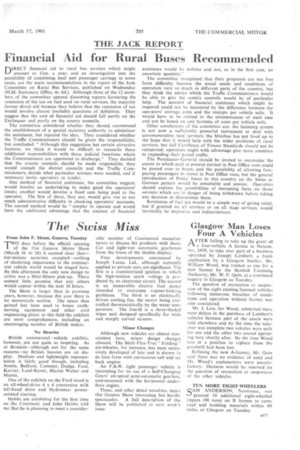THE JACK REPORT
Page 51

If you've noticed an error in this article please click here to report it so we can fix it.
Financial Aid for Rural Buses Recommended
nIRECT financial aid to rural bus services which might
amount to Lim. a year, and an investigation into the possibility of combining mail and passenger carriage in some areas, are the main recommendations in the report of the Jack Committee on Rural Bus Services, published on Wednesday (H.M. Stationery Office, 4s. 6d.). Although three of the 12 members of the committee append dissenting reports favouring the remission of the tax on fuel used on rural services, the majority favour direct aid because they believe that the remission of tax would involve almost insoluble questions of definition. They suggest that the cost of financial aid should fall partly on the Exchequer and partly on the county councils.
The committee considered whether they should recommend the establishment of a special statutory authority to administer the assistance, but rejected the idea. They considered whether the Traffic Commissioners should be given the responsibility, but concluded: "Although this suggestion has certain attractive features, we think it would be difficult to reconcile these additional responsibilities with those judicial functions which the Commissioners are appointed to discharge." They decided that the county councils should be made responsible; they would consult the district councils and the Traffic Commissioners, decide what particular services were needed, and if necessary invite operators to tender.
One method of financial assistance, the committee suggest, would involve an undertaking to make good the operators' losses; another would involve a fixed sum being paid to the operator. The first of these, they say, would give rise to too much administrative difficulty in checking operators' accounts. The second method would be "simpler to operate and would have the additional advantage that the amount of financial assistance would be definite and not, as in the first case, an uncertain quantity."
The committee recognized that their proposals are not free from difficulty because the social needs and conditions of operation vary so much in different parts of the country, but they think the advice which the Traffic Commissioners would be able to give the county councils would be of particular help. The amount of financial assistance which might be required could not be measured by the difference between the operators' average costs and the receipts per vehicle mile. It would have to be related to the circumstances of each case and not be based on any formula Of costs per vehicle mile.
Other conclusions of the committee are: the licensing system is not now a sufficiently powerful instrument to deal with unremunerative rural services; the Minibus has not lived up to the hope that it would help with the wider problems of rural services, but full Certificate of Fitness Standards should not be reimposed; operators might with advantage give more attention to expanding their parcel traffic.
The Postmaster-General should be invited to reconsider the extent to which mail at present carried in Post Office vans could be passed over to buses, and the possibility of allowing farepaying passengers to travel in Post Office vans, but the general introduction of Postal buses to this country on the Swiss or German pattern would be unsuitable and unwise. Operators should explore the possibilities of increasing fares on those services which arc in danger of being withdrawn before taking any decision to discontinue them.
Remission of fuel tax would be a simple way of giving relief, but if granted on all services or on all stage services, would inevitably be imprecise and indiscriminate.




































































































































